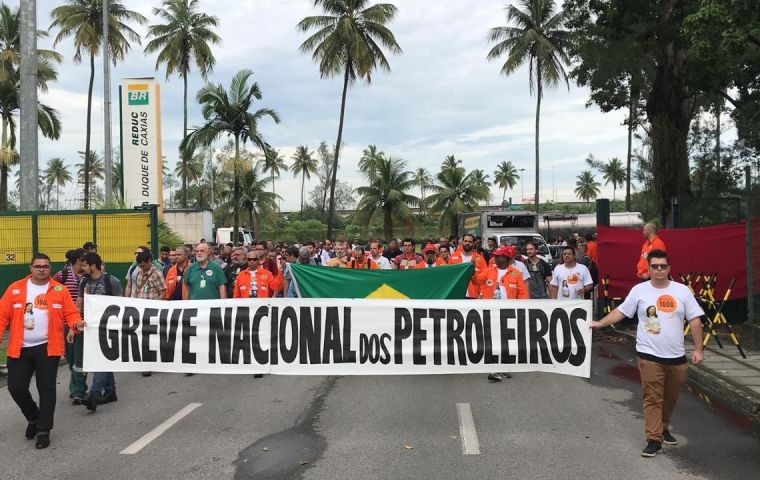MercoPress. South Atlantic News Agency
Oil workers on strike against Petrobras privatization plans
 Unified Federation of Oil Workers, FUP, said 21,000 employees in 13 states have joined the strike since it kicked off on Feb. 1, 60% of the company’s workforce.
Unified Federation of Oil Workers, FUP, said 21,000 employees in 13 states have joined the strike since it kicked off on Feb. 1, 60% of the company’s workforce. Brazilian oil workers and oil giant Petrobras were locked in a power struggle over the company’s privatization plans, with the union saying thousands of employees are on an indefinite strike.
A few hundred people gathered outside the headquarters of state-controlled Petrobras in Rio de Janeiro, wavering flags and protesting against recent layoffs in the state of Parana. The Unified Federation of Oil Workers, FUP, said 21,000 employees in 13 states have joined the strike since it kicked off on Feb. 1 — about 60% of the company’s workforce.
The company has been able to maintain oil and gas production levels and meet fuel demand across the country by bringing in temporary workers on emergency contracts that often involve longer shifts.
The union says 36 of Petrobras’ 39 offshore platforms in the Rio de Janeiro region, as well as several refineries across the country, are now run by such contingency teams.
The movement suffered a blow on Monday night, when Justice Ives Gandra of Brazil’s Superior Labor Court ruled that the strike was illegal and ordered fines equivalent to US$ 115,000 a day if it continues.
Oil workers said they would appeal the decision. A similar ruling last year by Justice Gandra was overruled by other members of the court, the union said in a statement Tuesday, calling for the extension of the 18-day strike.
Earlier this month, Gandra argued that the strike had turned “abusive” because unions did not comply with an order to guarantee that at least 90% of the workforce would resume their activities. As a result, Gandra authorized Petrobras to contract emergency workers and avoid drops in production.
Analysts said the question remains how long that can last. “I don’t see any fuel shortages. Today we are able to bring in imported products,” said Adriano Pires, director of a consulting firm, the Brazilian Center for Infrastructure. “If the strike goes on much longer, we could have a problem.”
President Jair Bolsonaro appointed Roberto Castello Branco, a pro-market reformer, as Petrobras’ chief executive. He and Finance Minister Paulo Guedes have both advocated in favor of selling the firm’s non-core assets, which remain mostly oil and gas exploration.
So far, Petrobras has discussed plans to sell eight refineries that process about half of the country’s refining capacity, as well as all the logistical assets linked to those units.
“Petrobras’ new administration has a divestment plan in areas that are not viable. The strike is an attempt to stop this process,” Pires said.
Earlier this month, Decio Oddone, the outgoing director-general of Brazilian oil regulator ANP, said the emergency hires were not a long-term solution and that fuel supplies remained at risk.
The agency says it is monitoring the strike and will take action to ensure supply if necessary.
The FUP says workers are striking against Petrobras' closure of the loss-making Fafen-PR fertilizer plant, and more broadly against the company's US$20bn-US$ 30bn divestment plan, particularly the planned sale of around half of the company's 2.2mn b/d of domestic refining capacity.




Top Comments
Disclaimer & comment rulesCommenting for this story is now closed.
If you have a Facebook account, become a fan and comment on our Facebook Page!